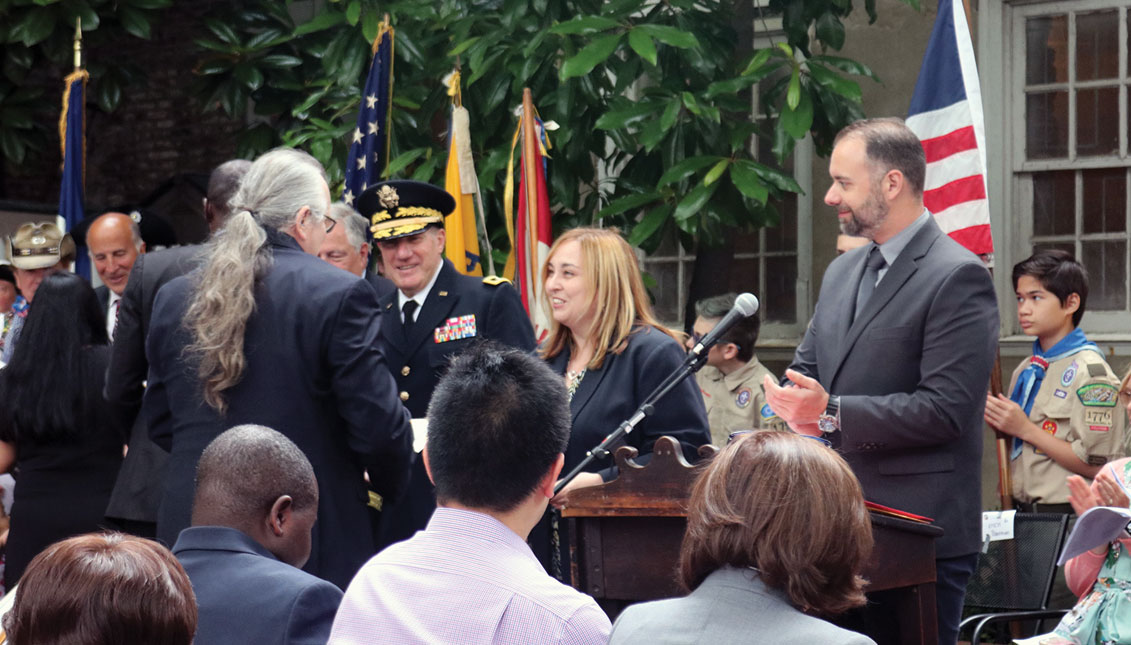
Naturalized citizens share their immigration stories
The naturalization process is individualized and often difficult. On June 11, AL DÍA spoke with a few New Americans to learn about their triumphs and…
In 2018, more than 750,000 people became American citizens through the naturalization process, guaranteeing them the rights of U.S.-born citizens.
At a naturalization ceremony held on June 11, Symbol Lai, deputy officer for the Office of Immigrant Affairs, spoke to the many obstacles that the 51 new inductees had overcome.
“Today marks the end of a very long and complicated and sometimes good, sometimes not good, sometimes difficult journey of resettling in the United States,” said Lai.
Lai’s words echoed in the drum beats of Al-Bustan group, who rang in the new citizens with their sounds from the Middle East, showing no matter how far immigrants have traveled to be here, they carry their roots.
Held at the Free Library of Philadelphia, a local partner of USCIS who works to facilitate access to the naturalization process, the ceremony was part of Immigrant Heritage Month, which honors New Americans and their contributions to the country.
It is the final step before New Americans gain citizenship, where they recite an Oath of Allegiance and is an often triumphant moment. Six days a week, United States Citizen and Immigration Services inducts 60 to 70 new citizens.
As the naturalized citizens waved their American flags high, smiles beaming, their families and friends cheered them on.
Though the event is celebratory, for many New Americans, the path to citizenship has not always been easy.
Amar Bessedik came from Algeria in 2010 to study and to escape upheaval in the country; at the ceremony, he noted his appreciation of American values of justice and democracy. After arriving to the U.S., his barrier to naturalizing was learning English.
“Coming here I found it really hard actually because I couldn't speak the English language. I couldn't understand the accents, my vocabulary was very limited, I couldn't even ask for ‘Are you hiring?’... I didn't know what the word hiring is,” said Bessedik.
Bessedik took ESL classes in community college before getting his B.A. in computer science, which helped him to pass the required English test that includes reading, writing and speaking.
In 2015, he could have pursued citizenship, because he had been a permanent resident for five years- the length needed before an immigrant can apply. But instead, Bessedik made the decision to focus on university.
The Free Library of Philadelphia hosts ESL courses and English roundtable discussions for immigrants like Bessedik to practice their English and to reduce the social isolation they often feel.
“Learning a language in general, it's like learning the culture of a country and you can maybe recognize yourself among people if you understand them and they understand you it's much easier,” said Bessedik.
His story is one of many that shows how each immigrant story is different, a sentiment reflected by Kathleen Bausman, field officer for the United States Citizen and Immigration Services.
RELATED CONTENT
“[Naturalizing] is a very individual personal choice,” Bausman said.
Karen Whittaker, originally from Zimbabwe, said becoming an American felt like a dream realized. For her, studying for the naturalization exam was difficult, as well as waiting to hear back after she got her fingerprints, which was a couple months.
“It was intense, mainly with when it came to studying the 100 questions. I had my family testing me every day,” she said.
For Diana Jimemez, a 24-year-old who will attend medical school in the fall, her barrier to the naturalization process was financial. When she was eight, her family was selected in a visa lottery program, which allowed her, her sister, and mother to come to the United States from Peru.
Her sister and mother first went through the naturalization process when she was 18. Jimenez wanted to become a citizen prior to attending medical school and becoming a doctor; but due to the cost of applying for naturalization — $725 — she had waited several years to start going through the process.
“The cost was definitely prohibitive. I waited a bit until I could save up money to apply,” she said.
The current cost for applying for naturalization is $725, which includes $640 for the application fee and $85 for biometrics. This went up from $595 (excluding biometrics) in December 2016.
For each immigrant who wants to become a naturalized citizen, they have their own challenges, but the sentiment for those who complete the process is one of hope.
Bessedik became part of the American framework, and now has the ability to hold office, vote, and travel without a visa. He hopes to one day bring his family to the United States to join him and his wife. For him, becoming a citizen was “a great achievement.”
For Jimenez, becoming a citizen made her proud of her family.
“It makes me proud of everything we have endured and accomplished,” Jimenez said. “A long process, so it's the goal, the finish line."










LEAVE A COMMENT: